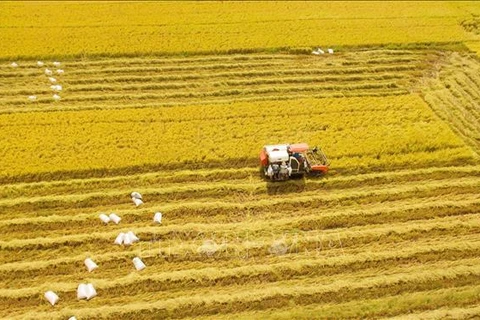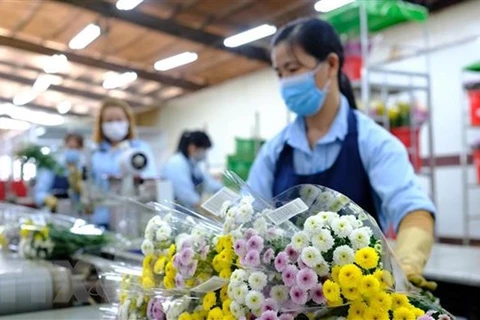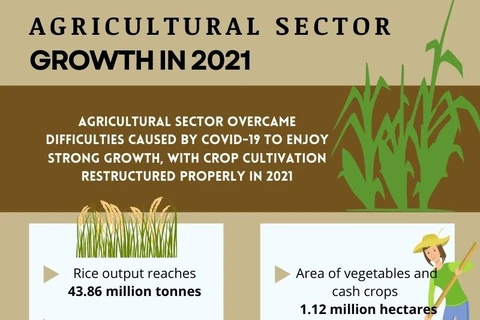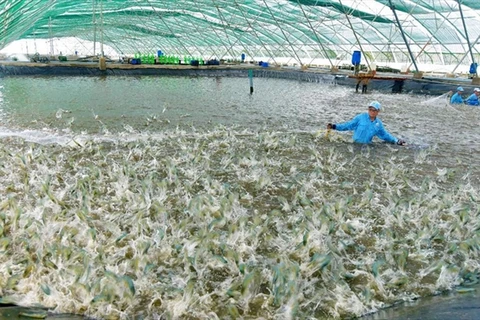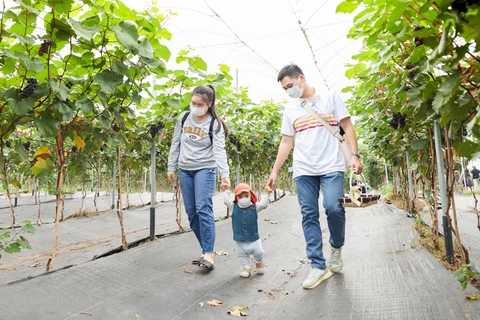Hanoi (VNA) – Deputy Prime Minister Le Van Thanh has signed a strategy for sustainable development of agriculture and rural areas for 2021 - 2030, with a vision to 2050.
The general goal is to develop cash crop cultivation based on local advantages; oriented towards high productivity, quality, effectiveness, sustainability, and competitiveness; firmly guarantees national food security; and substantially helps with socio-economic stability, natural disaster and epidemic prevention and control, climate change response, and effective implementation of international commitments on greenhouse gas emission reduction.
The strategy also aims to improve income, life quality, role, and stature of agricultural stakeholders; create non-agriculture jobs to help rural residents alleviate poverty and ensure equal development opportunities among the regions; comprehensively develop rural areas; uphold and bring into play the national cultural identity; and combine agricultural and rural economic development with new-style countryside building.
 A net house for vegetable cultivation in An Binh ward of Rach Gia city, Kien Giang province (Photo: VNA) Among the detailed targets for 2030, agriculture - forestry - fisheries are expected to achieve GDP growth of 2.5 - 3 percent, an increase of 5.5 - 6 percent in labour productivity, and exports rise of 5 - 6 percent each year on average.
A net house for vegetable cultivation in An Binh ward of Rach Gia city, Kien Giang province (Photo: VNA) Among the detailed targets for 2030, agriculture - forestry - fisheries are expected to achieve GDP growth of 2.5 - 3 percent, an increase of 5.5 - 6 percent in labour productivity, and exports rise of 5 - 6 percent each year on average.
Besides, the strategy looks to raise rural residents’ income by 2.5 - 3 times from 2020, bring down the multidimensional household poverty rate by 1 - 1.5 percent annually, reduce the percentage of agricultural workers to less than 20 percent of the total workers in society, and increase the rate of trained agricultural workers to over 70 percent.
It also targets at least 90 percent of the communes nationwide recognised as new-style rural areas, environmentally friendly agriculture adapted to climate change, and greenhouse gas emissions down 10 percent from 2020./.
The general goal is to develop cash crop cultivation based on local advantages; oriented towards high productivity, quality, effectiveness, sustainability, and competitiveness; firmly guarantees national food security; and substantially helps with socio-economic stability, natural disaster and epidemic prevention and control, climate change response, and effective implementation of international commitments on greenhouse gas emission reduction.
The strategy also aims to improve income, life quality, role, and stature of agricultural stakeholders; create non-agriculture jobs to help rural residents alleviate poverty and ensure equal development opportunities among the regions; comprehensively develop rural areas; uphold and bring into play the national cultural identity; and combine agricultural and rural economic development with new-style countryside building.
 A net house for vegetable cultivation in An Binh ward of Rach Gia city, Kien Giang province (Photo: VNA)
A net house for vegetable cultivation in An Binh ward of Rach Gia city, Kien Giang province (Photo: VNA) Besides, the strategy looks to raise rural residents’ income by 2.5 - 3 times from 2020, bring down the multidimensional household poverty rate by 1 - 1.5 percent annually, reduce the percentage of agricultural workers to less than 20 percent of the total workers in society, and increase the rate of trained agricultural workers to over 70 percent.
It also targets at least 90 percent of the communes nationwide recognised as new-style rural areas, environmentally friendly agriculture adapted to climate change, and greenhouse gas emissions down 10 percent from 2020./.
VNA

